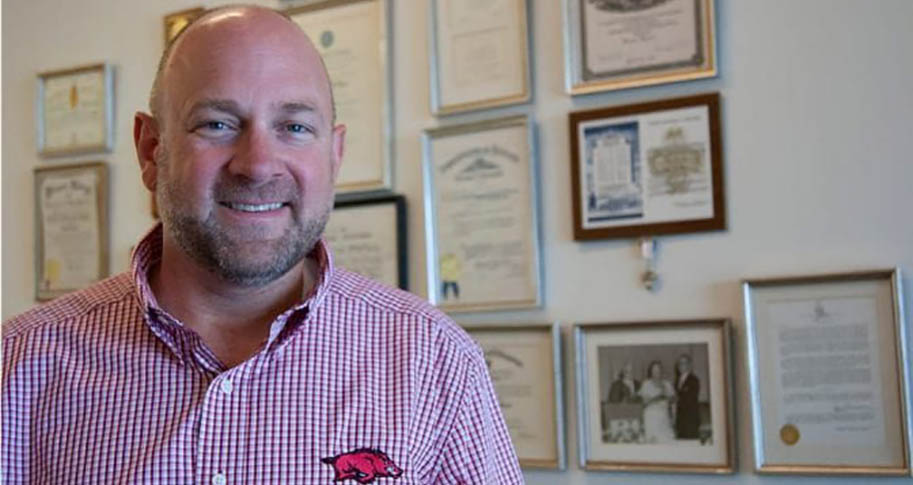
David Dobrzykowski almost became a career professional bowler. The calling was so strong, he took a break from college so that he could compete on the national tour. But life on the road wasn’t for him, and he returned to Toledo, Ohio, where he pursued a marketing degree.
Upon graduation, he sold his bowling pro shop and went to work with a national firm that provided hospital emergency department physician services. Here, he discovered that about 80 percent of the emergency departments in the United States were outsourced. “That was my introduction to supply chain,” he says.
Since then, Dobrzykowski worked as a health care administrator for about 13 years, acquiring a great deal of management experience by day and teaching experience at night as an adjunct professor. He earned his Ph.D. in 2010 and has been working to improve health care delivery through research and teaching ever since. On May 31, he joined the faculty at the Walton College as an associate professor with the Department of Supply Chain Management, a role he’s excited about. In fact, when he moved to Northwest Arkansas, a neighbor told him, “Welcome to Disney World!”
And that was meant in the best possible way.
“It’s an incredible opportunity and honor to be here,” he says. “The Walton College has a world-class reputation across several disciplines and, of course, in supply chain management.”
For Dobrzykowski, Northwest Arkansas is like the Magic Kingdom, a place where opportunities abound. His mission is to help the Walton College play a significant role in improving the nation’s health care system by taking advantage of the economic opportunities in the area, noting that Walmart, which is based in nearby Bentonville, offers Walmart Care Clinics in several states. He also sees potential for Northwest Arkansas to become a health care destination, much like Rochester, Minnesota, home to the Mayo Clinic, or Cleveland, Ohio, which has the Cleveland Clinic, both renown academic medical centers.
Dobrzykowski’s drive was fueled when, as a regional chief executive officer for a portfolio of MRI centers, he observed a fragmented health care system in much need of efficient supply chain management. He saw physicians on different reimbursement schedules than hospitals making medical decisions that had substantial operational and financial implications for the hospitals within which they treated patients. He also saw the challenges that patients and providers have in dealing with the complex health care system. “If you’re not highly proactive and engaged, there is a good chance that you will encounter frustration in navigating the health care system,” he says.
One thing that could be helpful for patients is increased transparency related to cost and quality ratings for health care services, he says. While people can go online to see user ratings for the cars and appliances they plan to buy, widespread systems are still emerging where people can access this type of information to compare health care options.
By the same token, there is much that patients can do to reduce their chances of being in that situation in the first place, Dobrzykowski says.
“Our current insurance system is designed so that healthy people subsidize the unhealthy people,” he says. “Further, employers and the federal government pay for the vast majority of the health care services we receive. We need to continue to do more to incentivize healthy behaviors and consumer engagement.”
Besides serving as a CEO for a portfolio of MRI centers, Dobrzykowski also worked as a regional director in the health insurance industry with UnitedHealthcare before earning his Ph.D. in manufacturing and technology management from the University of Toledo. He earned tenure while on faculty in the Department of Supply Chain Management at Rutgers Business School and now teaches graduate-level supply chain management courses and executive education at Walton. His research has appeared in a number of top-ranked supply chain journals, including the Journal of Supply Chain Management, Decision Sciences Journal and Journal of Operations Management.
Dobrzykowski says the University of Arkansas’ supply chain management team has an excellent reputation for being driven and motivated. “They are nice people who are trying to drive innovation around the globe, starting right here,” he says.
He aims to be part of that movement as he explores ways to restructure health care policy to enable better coordination of information, material and financial process flows; health care delivered flawlessly.
And, yes, he has bowled a perfect game – 300 score – several times. “There are not a lot of bowling professors out there, that’s for sure,” he says.




